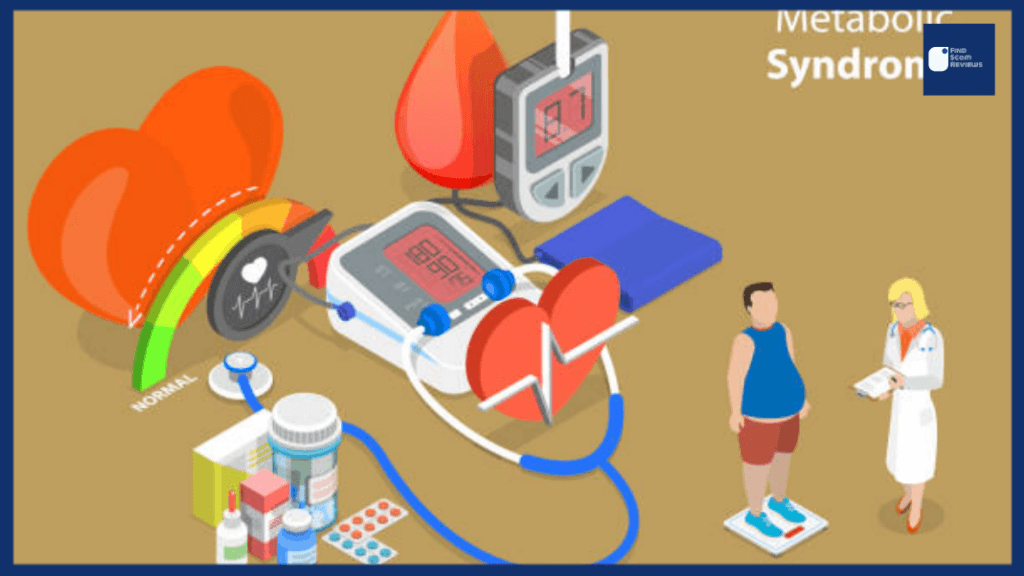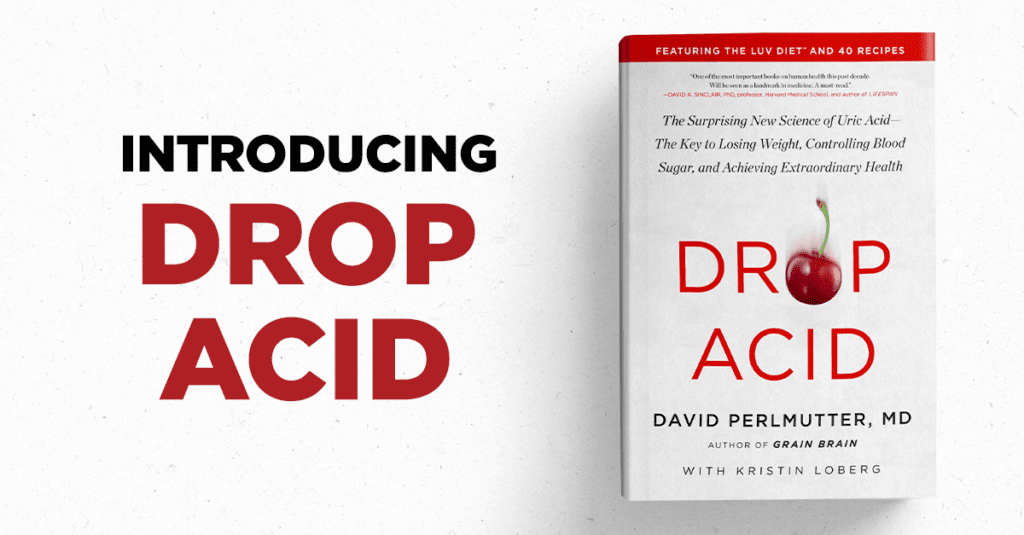
Uric Acid: A Primary Cause of Obesity, Diabetes, Heart Disease, and Dementia (Dr. David Perlmutter)
What is the connection between obesity, insulin resistance, diabetes, fatty liver disease, hypertension, cardiovascular disease, stroke, neurological disorders, and premature death?
Well, poor metabolic assistance. Specifically, many of them are associated with elevated uric acid levels. Specifically, many of them are related to high uric acid levels.
Not only are we metabolically dysfunctional, but the leading causes of death on the planet, not COVID, are downstream metabolic issues and chronic degenerative conditions that transcend epidemic proportions.
It is significant because 88% of American adults have at least one component of metabolic syndrome.
Dr. David Perlmutter’s book Drop Acid reveals the surprising new science of uric acid.
Dr. David Perlmutter, a New York Times best-selling author, recently published Drop Acid.
He serves on the board of directors and as a fellow of the American College of Nutrition. In his book, he explains that he was inspired to do so after being somewhat dismayed by the lack of nutrition instruction in medical school.
He serves on the Editorial Board of the Journal of Alzheimer’s Disease and has published extensively in scientific journals with peer review.
His books have been translated into 32 languages and include some of my favorites, such as the New York Times bestseller Grain Brain, Brain Maker, and Brain Wash.
And it would be an understatement to say that these books have contributed to a tectonic cultural shift in our understanding of the impact of diet, microbiome, and lifestyle factors on our risk for many of the symptoms and diseases plaguing the American population.
Drop Acid was published in February. It introduces the revolutionary notion that uric acid is a crucial cause of metabolic dysfunction and that we can achieve optimal health by controlling it.
And this is an enormous contribution to the field. Copious amounts of research support it but has not been part of the mainstream conversation about metabolic health until this year.
Today, we will discuss how it contributes to insulin resistance and metabolic disease and how to combat it.
Managing Uric Acid Is Crucial for Metabolic Health

Attempts to improve metabolic health can frequently leave individuals feeling frustrated.
It may be difficult to achieve objectives such as weight loss or improved blood sugar despite making drastic dietary changes, engaging in vigorous exercise, and doing their best in the various lifestyle factors.
So frequently have I heard individuals express the belief that there must be something else, that they are missing something. They are correct.
Even though the health risks of uric acid elevation were first described in the late 1800s, uric acid’s central role in metabolic disorders has only become widely recognized in the past few years.
Yes, it has been known for a long time that uric acid is involved in conditions such as gout and kidney stones, but its central role in metabolic disorders has only recently been confirmed.
This 2016 research paper has an impressive title: “Uric Acid in metabolic syndrome: From an innocent bystander to a central player.”
The authors report:
Once considered a harmless metabolic byproduct, uric acid has recently been implicated in various chronic disease states, including hypertension, metabolic syndrome, diabetes, nonalcoholic fatty liver disease, and chronic kidney disease.
These authors and countless others are currently describing the central role of uric acid in causing metabolic chaos.
And scientific research demonstrates that metabolic health can be vastly improved by recognizing uric acid as the missing link that can be regulated to normalize metabolism.
Dangers posed by uric acid
The increased risk associated with uric acid is undeniable, as cardiovascular issues and stroke account for many deaths.
A uric acid concentration of seven is hazardous.
A 2018 study published in Annals of Rheumatism followed 90,000 adults, 42,000 men, and 48,000 women for eight years.
They discovered that individuals with uric acid levels of seven or higher had a 16% increased risk of all-cause mortality or death from any cause.
They had a 38% risk of cardiovascular mortality due to uric acid and gout.
An increased risk of death from a stroke of 32%. Intriguingly, the risk of what is known as all-cause mortality, or dying from any cause, increases by eight to thirteen percent for every additional point of elevation above seven, a phenomenon that we observe daily.
How to Reduce Uric Acid Naturally in the Body

1. Avoid sugar
Based on our genetics, there is no reason to consume excessive sugar in our daily diets.
Each day, we need to consume zero grams of sugar. Everything else is extra.
Sugary foods
While high uric acid levels are commonly associated with a protein-rich diet, sugar consumption may also play a role.
Fructose is found naturally in fruit and honey. Purines are released as the body breaks down fructose, and uric acid levels rise.
In addition to table sugar, corn syrup, and high fructose corn syrup are other sugars added to foods.
Take the following measures to reduce the amount of sugar you consume:
- Eat more natural foods.
- Limit packaged and processed foods.
- Check for added sugars on food labels.
- Fruit will satisfy your sugar cravings.
Sugary beverages
A carton of fruit juice contains far more fructose than is biologically necessary or manageable based on our genetics.
Sugary beverages, soda, and even fresh fruit juices are frequently high in sugar.
The primary concern is the fructose found in apple juice and orange juice. It states, “Pure orange juice.” There are 36 grams of sugar per glass. And that is not natural in any way.
Due to the absence of fiber, protein, and other nutrients, fructose in beverages is absorbed more quickly than sugars in whole foods. According to research, the faster absorption of refined sugars causes an increase in blood sugar and uric acid levels.
Replace sugary drinks with:
- Water
- Sparkling water
- Herbal, black, or green tea without sugar
- Coffee (without added sugar)
2. Avoid alcohol
Alcohol consumption can cause dehydration. According to research, it can also increase uric acid levels.
Beer is the worst player by far. Because it contains more purine than other foods, even low-purine alcoholic beverages can increase purine production in the body.
Alcohol stimulates the metabolism of nucleotides, an additional source of purines that can be converted to uric acid.
Additionally, alcohol affects the rate at which uric acid is secreted, which can result in elevated blood levels.
3. Increase your fiber consumption
A daily apple keeps the doctor at bay. Five apples per day will cost you your health.
In addition to balancing your blood sugar and insulin levels, fiber can help you maintain a healthy weight. Increased fiber consumption can reduce uric acid levels. Additionally, it tends to increase satiety, reducing the risk of overeating.
The majority of adults should aim to consume 22 to 34 grams of fiber from food sources such as:
- Apples
- Pears
- Lentils
- Brown rice
- Quinoa
- Spinach
- Oats.
Increase your fiber consumption gradually to avoid digestive discomfort.
4. Boost vitamin C intake
According to some studies, a high vitamin C intake can help reduce uric acid levels.
However, additional research is required to determine how vitamin C affects uric acid levels in the body.
Consult your physician about the potential benefits of increasing your vitamin C intake. The recommended daily allowance of vitamin C for most adults is between 75 and 120 milligrams, while the upper daily limit is 2,000 milligrams.
You can increase your vitamin C intake by eating more fruits and vegetables like oranges.
- Oranges
- Grapefruit
- Kiwi
- Strawberries
- Melon
- Red and green peppers
- Broccoli
- Tomatoes
There are also vitamin C supplements available without a prescription.
5. Consume cherries (Benefit of Quercetin)
Researchers have discovered that eating cherries and drinking cherry juice can reduce uric acid levels in gout sufferers.
Further research is necessary to determine the long-term effects of cherry consumption on uric acid levels.
Cherries are red due to anthocyanins and quercetin, an antioxidant and anti-inflammatory compound. In addition, they are a good source of fiber and vitamin C.
Consider consuming a handful of cherries or unsweetened tart cherry juice.
In addition, Dr. David Perlmutter mentions quercetin as a nutritional supplement.
Comparable in effectiveness to allopurinol (gout pill).
In a study involving 22 young men with mildly elevated uric acid levels, 500 milligrams of quercetin daily reduced uric acid levels by 8% in just eight weeks.
You can immediately inhibit xanthine oxidase by taking 500 milligrams of quercetin or 100 milligrams of luteolin daily. You can also aid in the excretion of uric acid by taking 500 milligrams of vitamin C daily.
6. Try Ikaria lean belly juice
According to Ikaria Lean Belly Juice manufacturers, the supplement can help maintain normal uric acid levels, making it easier to eliminate waste and shed pounds.
According to the manufacturer, the daily consumption of one scoop of Ikaria Lean Belly Juice has the following effects:
Support Normal Uric Acid Levels
Uric acid is eliminated through urine in a healthy body. Some diets, however, can increase uric levels to the point where the body struggles to eliminate uric. This is known as gout. Several studies have found a correlation between weight and uric acid.
In this study, for instance, researchers compared the uric acid levels of individuals before and after weight loss. They discovered that uric acid levels decreased by 3 points after individuals lost 16 pounds.
Support Heart Health
Cardiovascular disease is the leading cause of death in most countries worldwide. Ikaria Lean Belly Juice purports to support cardiovascular health with ingredients such as beetroot extract, which is associated with increased nitric oxide (NO) levels. NO is essential for supporting blood vessel flexibility and heart health.
Support Inflammation
Inflammation is a symptom of stress, which causes the body to retain fat. If your body has high levels of inflammation, it will be difficult for you to lose weight.
Natural antioxidants such as resveratrol, fucoxanthin, and EGCG can support inflammation and oxidation throughout the body when Ikaria Lean Belly Juice is consumed daily.
Support a Normal Appetite
Ikaria Lean Belly Juice is designed for people who want to lose weight without a strict diet or rigorous exercise. To accomplish this, Ikaria Lean Belly Juice contains appetite-suppressing ingredients that help you naturally consume less food. You may finish your favorite foods until you are satisfied.
However, Ikaria Lean Belly Juice’s ingredients can make you feel fuller more quickly. For instance, fiber absorbs water in the digestive tract to make you feel full.
Help Eliminate Fat
Some weight loss supplements increase fat burning, but the fat continues to circulate in the body. Ikaria Lean Belly Juice claims to aid in fat loss and elimination. The supplement improves digestion and cleansing and the health of the liver and kidneys.
Ikaria Lean Belly Juice can help flush fat from the body and support weight loss if you want to flush fat out of your system.
Other Effects
According to the manufacturer, Ikaria Lean Belly Juice also supports cognition and mental energy, prevents the formation of new fat cells, and promotes overall health and longevity – effects comparable to those enjoyed by the Greek residents of Ikaria due to their regular diet and lifestyle.
ALSO READ: Uncovering the Ikaria Lean Belly Juice Scam: Scam or Superfood?
NOTICE
Affiliate Disclosure
The links contained in this product review may result in a small commission if you opt to purchase the product recommended. This goes towards supporting our research and editorial team and please know we only recommend high-quality products.
Disclaimer
This content including advice provides generic information only. It is in no way a substitute for a qualified medical opinion. Always consult a specialist or your doctor for more information.
While the information shared here can be helpful, please remember that it is not a replacement for advice from a licensed medical professional. If you have concerns or are taking medication, please speak with a doctor before making any decisions.
Additionally, keep in mind that individual results may vary as these products are not regulated by the Food and Drug Administration. These products are not designed to diagnose, treat, cure or prevent any disease.


